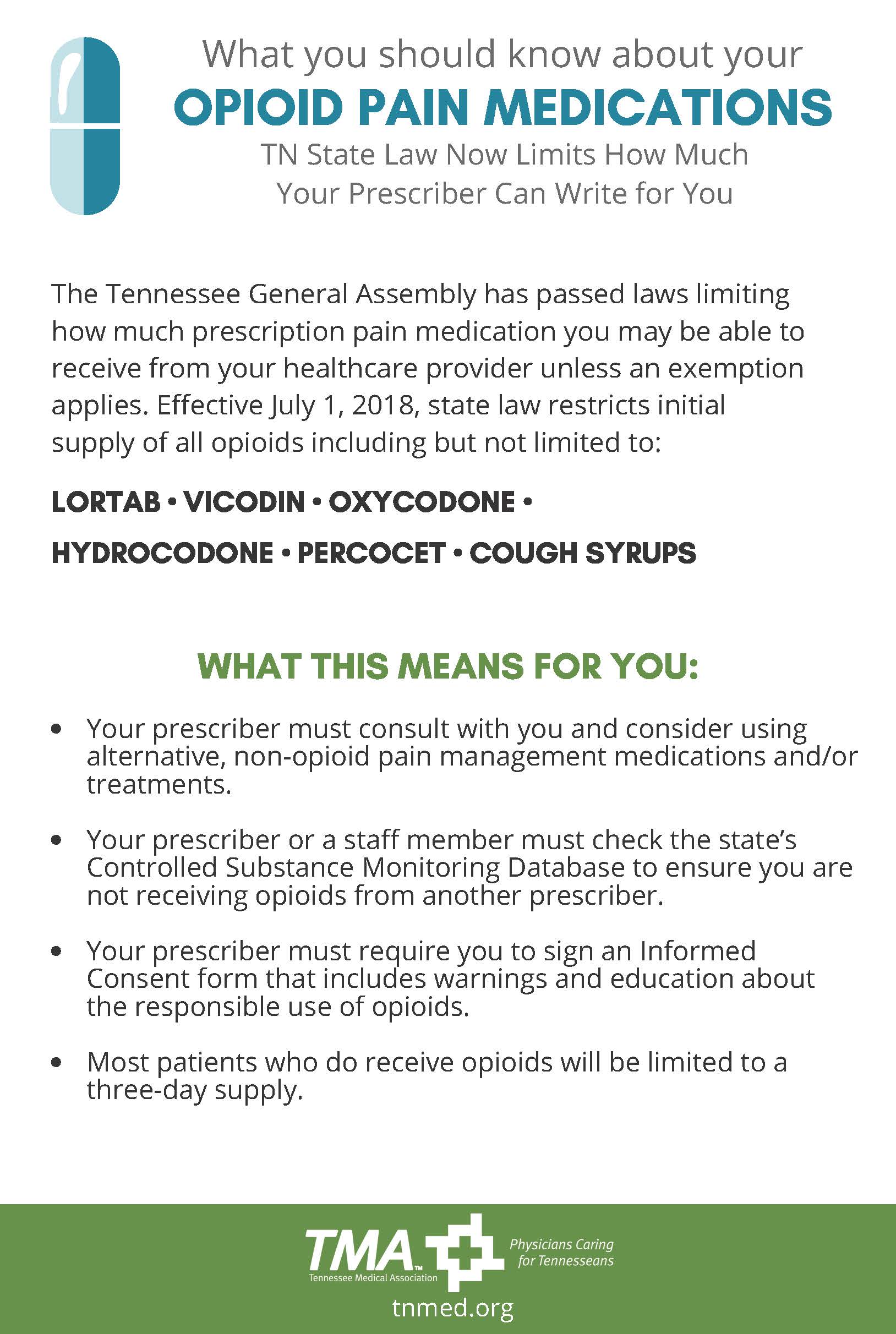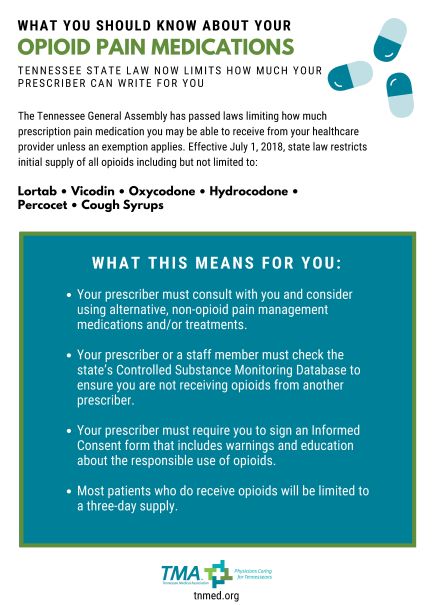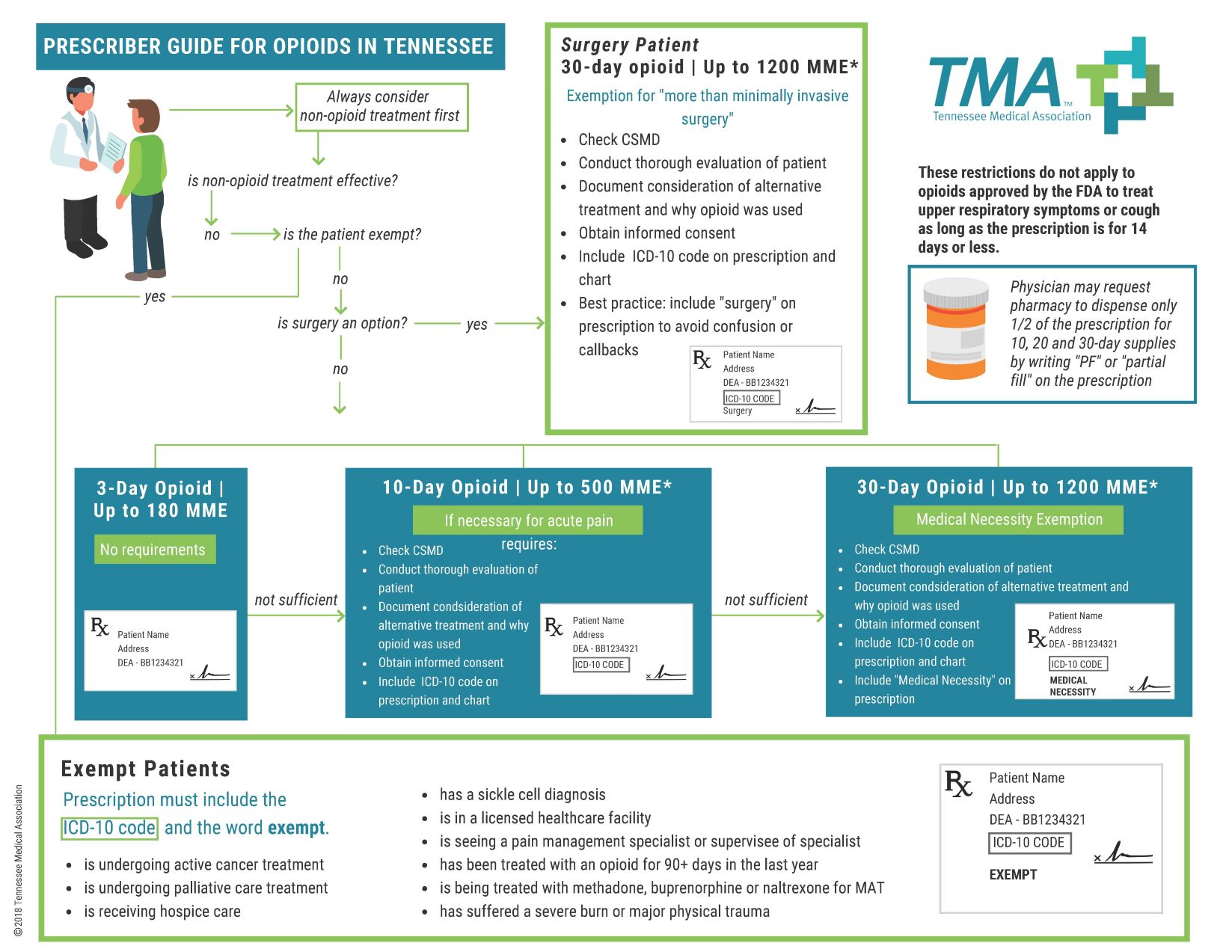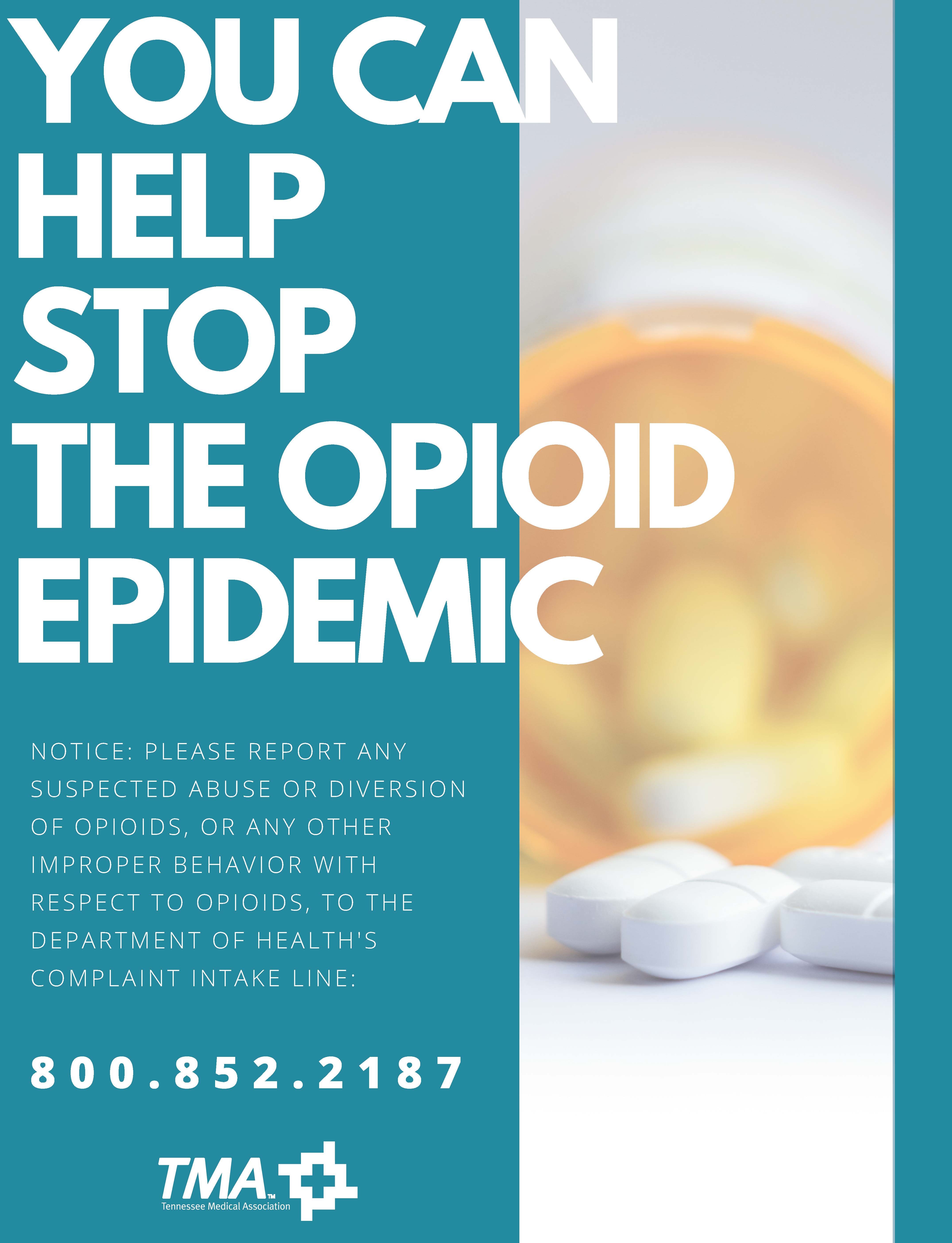TMA Opioid Resource Center
The medical community, and more specifically TMA, has been working for several years to turn back the dial on what physicians initially thought were safe drugs, so we can curb the initial supply and help prevent misuse and abuse. Explore these resources and help fight Tennessee’s opioid epidemic.
Tennessee Opioid Prescribing Law
The Tennessee General Assembly in 2018-2019 passed some of the most comprehensive and restrictive laws in the U.S. (PC 1039 and PC 901) regulating initial opioid supply. While TMA was able to make significant improvements to Gov. Haslam’s first “TN Together” legislation in 2018, some of the unintended consequences doctors initially feared the new law would create manifested across the state. TMA worked with the legislature to further amend the law to address specific issues raised by doctors and patients, and to make sure the laws help reduce opioid supply without unreasonably obstructing patients from accessing legitimate, effective pain management.
TMA has developed these resources to help doctors and other prescribers understand and comply with Tennessee’s opioid prescribing laws.
Patient-Facing Pocket Card Explaining New Opioid Prescribing Laws
This 4x6 pocket card gives patients a quick overview of new prescribing laws and what to expect when receiving an opioid prescription.

Patient-Facing Poster for Examination Room
This poster, available in multiple sizes, gives patients a quick overview of new prescribing laws and what to expect when receiving an opioid prescription.

T.C.A § 63-1-601 requires any entity that prescribes, dispenses or handles opioids to provide information to employees about reporting suspected opioid abuse or diversion. TMA has created a sign for use in non-public areas, regularly used by employees.
Calculating Morphine Milligram Equivalent (MME) is required under the new law
CDC MME Calculator
Tennessee Tools & Guidelines
Federal Tools & Guidelines
Education & Training
Appropriate Prescribing in Tennessee
In this program, physicians and other healthcare professionals will engage in a comprehensive review of new definitions, laws and other regulatory changes affecting pain management. This program will help health care clinicians understand and adhere to prescribing guidelines to keep patients safe, and protect themselves from inadvertently contributing to the exploding prescription drug abuse epidemic. Physicians will learn about the proper use and responsible management of pain clinics and the importance of educating patients on the pain medication prescribed.

TAKE COURSE
Proper Prescribing Education Bundle
These videos cover TN Pain Laws, Pain Physical Exam, Pain Psychology, Pain Assessment, Multi-modal Medication Treatment Options, Addiction Management, Treating the Addicted Patient with Pain, Medical Decision Making, Weaning Pearls, Neonatal Abstinence Syndrome and a discussion on Legalization of Medical Cannabis. Completion of this entire series will meet the TN licensure renewal requirement for prescribing. Prescribers will receive a 10% discount for purchasing all courses in this series as a bundle.

TAKE COURSE
What is TMA Doing?
TMA was the catalyst to changing the prescribing educational requirements for Tennessee physicians and has led the way on important public policies and other initiatives.
-
Our members served on the physician committee to develop new opioid prescribing guidelines approved by state licensing boards.
TMA members have delivered live and online prescription safety education courses to more than 5,000 of their peers across the state since 2012. -
Physicians have been instrumental in the state’s developing, implementing and improving the Controlled Substance Monitoring Database, which has shown real results.
-
TMA along with the TN Pharmacists Association helped pass the original law implementing the CSMD and was the first state medical society in the U.S. to support mandated controlled substance database lookups by prescribers.
-
-
We are particularly concerned about Neonatal Abstinence Syndrome, lobbying for passage of the Safe Harbor Act in 2013, and important changes to related legislation that passed in 2014.
-
TMA helped pass the original state law requiring pain clinic registration, supported the Addison Sharp Act requiring pain clinic guidelines and mandatory CME by prescribers of opioids, worked to pass legislation to required specialty training for pain clinic medical directors, and supported legislation to eliminate dispensing in pain clinics.
-
We have been proactive, vocal contributors to state programs even when we are not invited to participate, including the “Prescription for Success” plan in 2014 and, more recently, Governor Haslam's TN Together Initiative.
-
We worked with the General Assembly in 2018 and 2019 to make sure new prescribing laws helped reduce opioid supply without over-regulating the practice of medicine or unreasonably obstructing patients from accessing legitimate, effective pain management.
We need active input and support from all stakeholders to turn the tide on this epidemic.
-
Data shows most addicted patients actually get drugs from a friend or relative, but we still need to control the supply by changing our prescribing patters and approach to pain management.
-
We need to continue educating healthcare providers on diagnosis-based screening and treatment protocols.
-
We need to continue educating patients about the dangers of opioids including safe storage and proper disposal.
-
We need more funding for and better access to comprehensive treatment programs for addicted patients, eliminate the stigma associated with addiction and treat it as a chronic disease.
*The Tennessee Medical Association is accredited by the Accreditation Council for Continuing Medical Education (ACCME) to provide continuing medical education for physicians.
Tennessee Medical Association designates this live activity for a maximum of .75 AMA PRA Category 1 Credit™ (Enduring). Physicians should claim only the credit commensurate with the extent of their participation in the activity.




